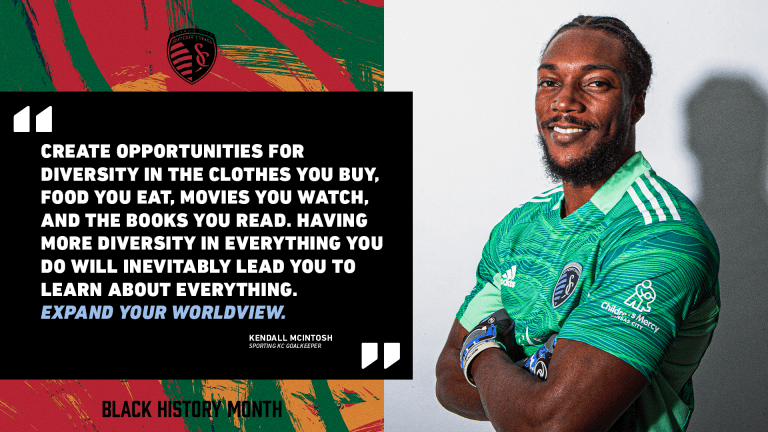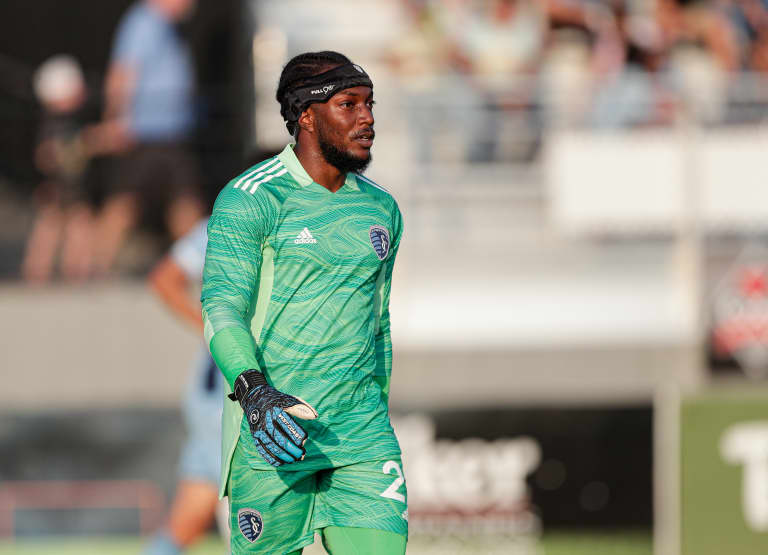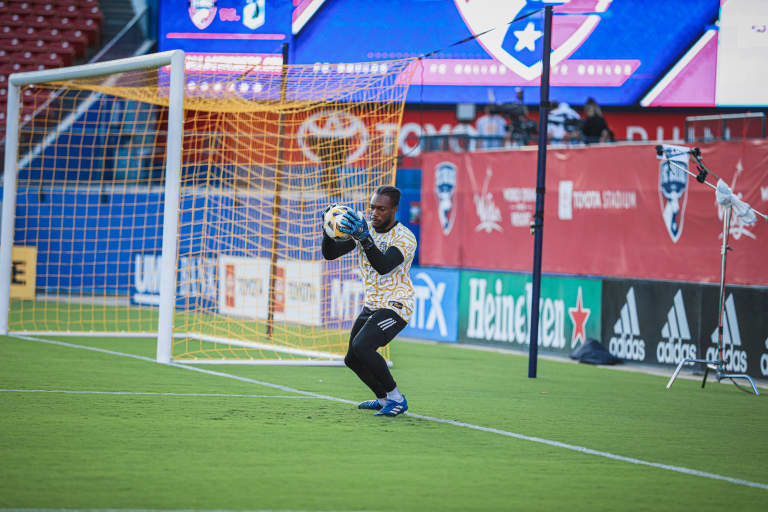Throughout February, Sporting Kansas City will amplify black voices within the club, community and front office in order to emphasize the awareness, education and celebration of black culture. Part one of this series is a written interview with Sporting KC goalkeeper Kendall McIntosh.
McIntosh joined Sporting in January 2021 after stints with the Portland Timbers and New York Red Bulls. As he expresses in the interview below, McIntosh is proud of his culture and heritage. He hopes that Black History Month will start conversations and inspire people to bring more diversity into their life year-round, not just in the month of February.

From your perspective, what is the value and purpose of Black History Month?
Black History is American history, it’s world history and something that should be celebrated and revered year-round. I don’t think it’s something that should have to be focused on for just one month. Black history is LGBTQ history. It’s Latino history. Black history is all history. To say it’s Black History Month and this is the only month we have to focus on that is reductionist in terms of the whole spectrum of black and brown people of color.
Where would you like to see black history integrated more?
It’s about education. We touch on slavery and Jim Crow Laws in school but there is so much that’s still ingrained in American culture and the socio-political sphere. There are a lot of things that are systemic.
Slavery was a big part of how the country was created but it’s taught like, slavery happened, and it was bad. We’re taught that the founding fathers were great, but they were slave owners. We gloss over many things.
The more we teach and learn as a homogenous group of people and as less segregated groups of people the better. There’s so much about history that is known but not taught.
How do you and your family celebrate your ethnicity?
We celebrate being black people, and we love that we’re black. We love our skin, we love our culture and we love our people. It’s more about being who you are and loving yourself. We love being black and we wouldn’t have it any other way. I was taught to love what my skin represents. That this was something to be revered and that black is beautiful and black is powerful.
Black is also oppressed in an unavoidable way. We had to learn that people are going to set up obstacles for us and that we essentially had to be better than everyone else to get the same opportunities.
For my family, education is a big thing. I’m a fourth-generation college student on my mom’s side. My dad went to Harvard and Stanford. My brother went to Duke, earned his master’s and is now at Michigan for law school. We celebrate that black people are educated. Just because we as a people are oppressed doesn’t mean you have to feed into that oppression.
I had only ever been to private school, so a majority of my cohort was white. My brother and I didn’t feel like we fit in. My dad would tell us that if you feel uncomfortable and you’re putting out that energy it’s going to be difficult for you to learn and grow in that environment. Act like you belong because eventually, you will.
If you’re constantly dealing with oppression, it’s difficult to live in that space. If you are a black person everything you do is black. When we were younger, people would tell my brother and me that we were really well-spoken. People would say that we speak like white people. No, we speak like black people because we are black and anything we do is black.
Understanding that we needed to embrace ourselves before others would embrace us and being comfortable in ourselves really helped us grow. We realized that we didn’t have to act to fit in. It’s about being comfortable with ourselves, so others feel comfortable with us.
There are times as a black man when you’re surrounded by people who are not your racial peers. You’re going to have to be comfortable with that if you want to live the life that you want to live. The higher you go up the more white and male it looks. My dad taught us to live in a world that’s not for us. That’s something you have to learn as a person of color, but is that the best thing for us as a culture? For one subsection to live how they want to live and forcing other subsections to learn how to live in that world. That needs to change.

What does it mean to be an athlete whose skin color is black?
Everything I do will be seen as a black athlete and not just an athlete. Being well-spoken, articulate and analytical about the game in a way that is not expected from me as a black person is something that is really important to show.
Athletes are athletes but for some reason, there’s a stereotype that black athletes are only naturally athletic and physically dominant. That we’re like unicorns. There are people who are physically superior to other people, but I’m not sure if that has anything to with race. There is some component that is natural but, there is another 90% that is not. It’s about training, dedication, focus and skill acquisition. It has nothing to do with race.
Michael Jordan is an amazing athlete. If he didn’t dedicate himself, learn how to become an elite scorer and enhance his competitive fire we would not know who he is despite his physical gifts. The intangibles become tangible through work. It’s something you can’t touch because it’s on the inside. It’s not a black athlete thing, it’s an all-athlete thing.
Growing up as “just a gifted athlete” I would read articles saying that I overuse my athleticism or don’t know the game well enough. That’s not how I saw myself at all. One of my strengths is being analytical about the game. I identify deficiencies and make them better. That’s why I’ve advanced in my career. Leading by example, being articulate, being analytical and reading the game as an athlete and tactician is very important as a black athlete.
I want to show myself as something more than just a strong body. I don’t want there to be a box that black athletes are put into. Being labeled as just a strong body with lots of power casts aside everything we are mentally and emotionally. It’s important for me to show that black athletes are more than that.
What advice do you have for young athletes of all backgrounds coming in the generation after you?
Control your controllables. You can’t control what somebody writes about you, or what other people think about you. What can you control? Mastering your craft.
The more you can immerse yourself in your sport the happier you’ll be. The media is brutal. You can have a flyer of a game and people will write great things, but then you have a rough patch and people will say you’re terrible. It’s a very difficult thing to live your life on that roller coaster of the media.
I would have my mom drop me off at the field, and I would play until I called her and that’s how I got better. I would watch hundreds of highlight videos of goalkeepers then go work on what I saw. Put in the time mentally, emotionally and physically to get better at your sport for yourself. Even I’m not done with the process of learning and mastering my craft. That is the biggest thing that will help not only black athletes but all athletes.

What are ways people can inform and educate themselves about Black History?
Create opportunities for diversity in the clothes you buy, food you eat, movies you watch and the books you read. Having more diversity in everything you do will inevitably lead you to learn about everything. Expand your worldview.
Once we reach an understanding that there is so much diversity in the U.S., we can start to learn. The more diversity we have the more we will learn and the more comfortable we’ll feel asking questions. Not only about the black-American past but the white-American past which is rife with controversy. You learn a little now and a little later. You start asking questions and create this knowledge base.
You’ll want to attend things like marches and protests and learn more about those causes. We need to be more open to the diversity in our community in both the present and the past. Place yourself in positions to gain that knowledge. This will lead to discussions not just about black history but women’s health, the LGBTQ community or mental health. This helps not only yourself but everyone around you learn more about each other. That pooled resource of human capital is really important.
What can people do to promote diversity?
On Twitter Sporting posted about black-owned businesses that we should focus on in February. We should focus on going to them always. We shouldn’t just go to these businesses in February then go back to normal after. We shouldn’t focus on black things just because it’s Black History Month. We should focus on them because they’re good places. They provide opportunities for you to learn about a new culture. It’s awesome that we posted that, but we need to do more things like that throughout the year.
Create a richer and more diverse environment to grow your knowledge and your experiences not only in February but for the whole year. If your diverse experiences are going out to get tacos on Tuesdays, it doesn’t end up being a diverse experience. You’ll see the same things on the same day and get the same experience over and over. You aren’t experiencing the culture, the food, hearing the stories, learning, listening and immersing yourself in that environment. I think it would be beneficial for people to always diversify not just in the highlighted months.


